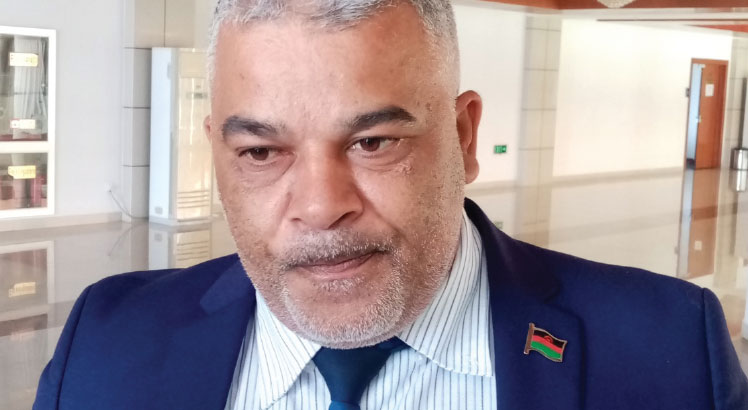Experts predict low crop outputs as 30% access AIP
Only 30 percent of fertilisers under the Affordable Inputs Programme (AIP) have been distributed to small-scale farmers as of December 2022, a situation farmers and experts fear could lead to low crop yields.
This was disclosed last Friday at a meeting Leader of Opposition in Parliament Kondwani Nankhumwa had with Smallholder Farmers Fertiliser Revolving Fund of Malawi (SFFRFM) officials in Blantyre.
The situation means only 750 000 small-scale farmers have benefited out of the 2.5 million targeted beneficiaries.
Sources confided in Nation on Sunday that the meeting took place at SFFRFM Chirimba Depot where Nankhumwa went to appreciate progress of the AIP fertiliser distribution exercise.
While SFFRFM chief executive officer Richard Chikunkhuzeni confirmed the figure, he referred the reporter to AIP national coordinator Justin Kagona.
Chikunkhuzeni claimed Kagona was in a better position to provide more details about the programme.

But when contacted, Kagona pushed the matter to Ministry of Agriculture spokesperson Geoffrey Juda who could not be reached as we went to press yesterday.
But our sources told Nation on Sunday on Thursday that as of December 2022, only 26 000 metric tonnes (MT) of Urea and 46 000MT of NPK were distributed.
While indicating that the redemption rate for seeds was at 70 percent, agriculture experts were not sure if SFFRFM had a specific target by December 2022.
During the same period last year, the cumulative redemption rate was at 38 percent for fertilisers and 50 percent for seeds.
On his part, Nankhumwa said he was compelled to meet SFFRFM officials following a public outcry on the erratic supply of fertiliser.
He said: “What they are saying is that SFFRFM only supplied 30 percent of the required fertiliser countrywide. Now 30 percent is a disaster, especially in the Southern Region where most areas have planted.
“If the situation is not swiftly looked into, then Malawians should brace for hunger.”
Nankhumwa urged government to open Agricultural Development and Marketing Corporation (Admarc) markets to complement SFFRFM depots, which are few.
Government closed Admarc on August 31 2022 as part of “redefining” its functions to serve Malawians better.
Despite Minister of Agriculture Sam Kawale announcing in Parliament on November 24 2022 that Admarc would be reopened on December 1 2022, the State produce trader remains closed.
For the past two weeks, Nation on Sunday efforts to get the status of Admarc reopening from the minister proved futile as he was elusive on the matter.
The AIP, which is Tonse Alliance’s flagship campaign promise, is currently marred by numerous irregularities including bribery, missing names, shortage of commodities, network glitches and few outlets for SFFRFM, the sole designated distributor.
The programme continues to face the same challenges it faced the previous two seasons despite government pledging to rectify them this season.
Officials from five out of the seven agricultural development divisions (ADDs) on Friday told Nation on Sunday that the AIP situation would lead to low yields this year.
The ADDs are Blantyre, Salima, Kasungu, Karonga and Shire Valley.
The officials, who spoke on condition of anonymity, said most farmers are yet to redeem the first fertilisers, which puts them at a disadvantage.
“Some areas have even become hard to reach with the rains. Neno, for example. There are delivery vehicles that are stuck due to poor roads compounded by the rains,” explained an official from Blantyre ADD.
An official from Karonga ADD said many beneficiaries are yet to receive the inputs, a situation that has left them stranded.
The source, however, said they were informed that there would be mobile selling points so that farmers can access farm inputs with ease.
Farmers Union of Malawi chief executive officer Jacob Nyirongo agreed with the ADD officials that AIP delays would lead to low maize yield this year.
He said: “The delays are costly as government has spent money on the farm inputs and yet output will be lower due to late application of fertilisers.
“At the current rate of fertiliser redemption, there is a high likelihood that most farmers will not access the fertilisers this season which may have a negative impact on food security, nutrition and income.”
On SFFRFM having few depots, Nyirongo said this was known from the beginning and government should have put in place strategies to address the challenge.
In the 2022/23 season, the number of AIP beneficiaries was reduced to 2.5 million from 3.7 million the previous season.
This means only a few beneficiaries are benefitting from the programme this year unlike in the past two seasons.
Agriculture policy expert Tamani Nkhono Mvula also said AIP delays would have a negative impact on crop output.
He said the challenges are due to poor AIP planning and implementation by government.
Nkhono Mvula wondered why government is failing to address these old age challenges.
Meanwhile, the Parliamentary Committee on Agriculture has described this year’s AIP a disaster and has since asked President Lazarus Chakwera to fire the AIP task force for incompetence.
The committee’s chairperson Sameer Suleman said in an interview on Thursday that the challenges rocking AIP will negatively impact the country’s food security.
He said: “How do you distribute Urea only in a few selected places and not NPK, which is needed for first fertiliser application. The government is not serious and I am calling upon the President to immediately fire the whole AIP task force. They are failures.”





